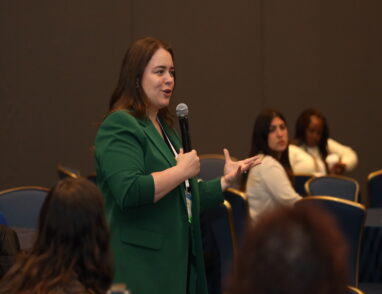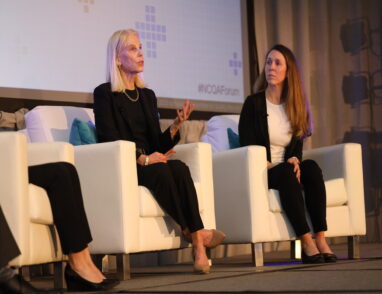How to be an LGBTQ+ Ally in the Workplace
June 25, 2024 · Becky Kolinski
Pride Month is a time to celebrate and uplift the LGBTQ+ community, learn about LGBTQ+ history and promote equality for LGBTQ+ people. In honor of Pride Month, NCQA’s LGBTQ+ Employee Resource Group hosted a training for employees on gender-expansive allyship in the workplace.
Being an ally is more than sharing gender pronouns—although that is an important first step. It’s about creating a workplace culture that supports psychological safety for LGBTQ+ employees.
Why is psychological safety important in the workplace?
Everyone wants to work in an environment where they feel safe, accepted and acknowledged. For LGBTQ+ employees, especially transgender, non-binary and gender-expansive employees, this includes feeling comfortable to express their gender truth without experiencing (intentional or unintentional) misgendering and harm from co-workers or company leaders.
When employees feel safe in the workplace, they feel more comfortable:
- Taking risks.
- Advocating for their needs.
- Expressing disagreement with other viewpoints.
- Sharing feedback.
- Making mistakes and learning from them.
Promoting LGBTQ+ allyship in the workplace can improve employee morale and encourage creativity, collaboration and teamwork.
How to be an LGBTQ+ ally in the workplace
You don’t need to know it all to be an effective ally. In fact, it’s impossible to know it all! Everyone brings a diverse history and unique perspective that is deeply rooted in their personal experience and identity.
Being an ally requires both courage and humility. It takes courage to step out of your comfort zone, confront your biases and expand your point of view. It takes humility to accept that you will make mistakes along the way.
Here are some ways to be an LGBTQ+ ally in the workplace:
- Engage in personal introspection about your own experiences and biases.
- Expand your vocabulary: Get comfortable with inclusive language, recognizing it is a “living” language that is always changing.
- Share your pronouns and make a habit of asking people you meet to share theirs.
- Accept discomfort as part of the learning process.
- Be curious and open to feedback.
- Hold yourself accountable for mistakes and harm, regardless of your intention.
- Remain connected to humility, compassion and humanity.
These principles can extend beyond the workplace as we interact with our friends, family and community.
NCQA’s commitment to DEI in the workplace
Providing diversity, equity and inclusion programming and training to our employees is one way NCQA strives to be an employer of choice, driving diversity of representation at all levels while fostering an inclusive culture.
“Our employee resource groups and DEI Council are an important part of how we create an inclusive workplace,” explained Jasmine Ashby, Manager of DEI and Engagement at NCQA. “Heritage month programming, like the gender-expansive allyship training hosted by our LGBTQ+ Employee Resource Group, helps ensure that we are equipping our employees with the tools and resources they need to be good allies, while also uplifting and celebrating our diverse employees.”
Visit our DEI webpage to learn more about NCQA’s commitment to inclusion.
How LGBTQ+ allyship relates to NCQA’s mission
NCQA’s commitment to equity is reflected in our mission to improve the quality of health care. We recognize that there can be no quality without equity.
One way we focus on health equity for LGBTQ+ people is by incorporating sexual orientation and gender identity (SOGI) data into our Health Equity Accreditation program.
By collecting SOGI data, health care organizations can better understand the needs and challenges faced by LGBTQ+ people as they access health care services. When we shine a light on disparities, we can work to close the gaps to ensure equitable care for everyone.
Watch our recent webinar, Foundational Standards to Support Effective, Sustainable Advancement of Equity, to learn more about NCQA’s Health Equity Accreditation.
Acknowledgments
Special thanks to Joli M. Ienuso for sharing their insights and creating a safe space for conversation and exploration of gender expansive allyship in the workplace.







